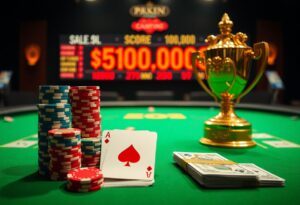You must cultivate emotional discipline to excel in poker, as it directly influences your decision-making and overall performance. Managing your emotions helps you avoid tilt, the state of frustration or anger that can lead to poor play and significant losses. By recognizing triggers and adopting strategies to maintain composure, you can transform challenging situations into opportunities for improvement. This guide will explore necessary techniques to enhance your emotional stability, allowing you to play more consistently and with greater confidence.
Understanding Emotional Discipline
Effective emotional discipline in poker involves managing one’s emotions to enhance decision-making and maintain focus during gameplay. This skill is vital, as it enables players to navigate the highs and lows of poker without falling prey to negative influences or impulsive actions. By cultivating emotional discipline, players can reduce the likelihood of tilt, thereby improving their overall performance and profitability.
Definition of Emotional Discipline
Emotional discipline refers to the ability to control one’s emotional responses, particularly in high-pressure situations like poker games. This involves recognizing emotions such as frustration, anger, or excitement, and managing them thoughtfully rather than reacting impulsively. Players who practice emotional discipline aim to maintain a steady mindset, allowing for clearer thinking and strategic play during challenging moments.
Importance in Poker
In poker, emotional discipline serves as a powerful tool against self-destructive behaviors arising from frustration or greed. A player lacking emotional discipline may chase losses or go all-in recklessly, leading to substantial financial setbacks. On the contrary, those who master this skill can remain calm and focused, making calculated decisions and effectively capitalizing on opponents’ mistakes. This distinction often separates profitable players from those consistently losing their bankrolls.
For instance, a study by the University of Alberta found that poker players with higher emotional intelligence consistently performed better than their less emotionally aware counterparts. Players who can quell their negative emotions or temper their excitement often find success in reading opponents and executing strategies effectively. This cultivated awareness enhances their decision-making, allowing them to withstand the variance inherent in poker and recover from setbacks without falling into negative patterns.
Types of Emotional Responses in Poker
In poker, players experience various emotional responses that can significantly affect their game. Emotions such as excitement, frustration, and aggression can lead to tilt, where poor decisions arise from emotional instability. Recognizing these responses is necessary for maintaining focus and discipline at the table. Developing an awareness of personal emotional triggers can prevent negative reactions and help enhance performance. Perceiving these emotions early allows for proactive management, ensuring players remain in control of their decisions.
| Emotional Response | Impact on Play |
|---|---|
| Excitement | Riskier bets and overconfidence |
| Frustration | Increased likelihood of tilt |
| Aggression | Uncalculated bluffs |
| Fear | Missed opportunities |
| Anxiety | Second-guessing decisions |
Common Emotional Reactions
Common emotional reactions in poker can vary greatly among players. Many experience a surge of joy after winning a significant hand, while others may feel immense stress during losing streaks. These reactions often trigger a cascading effect, influencing subsequent decisions and overall performance. Players must learn to navigate these highs and lows to maintain emotional discipline.
Identifying Personal Triggers
Identifying personal triggers is key to managing emotions effectively in poker. Understanding what circumstances lead to emotional surges allows players to plan proactive strategies. Common triggers might include bad beats, large losses, or even extended periods of poor performance. Recognizing these patterns can enable players to prepare mentally and react constructively.
By analyzing specific situations or hands that induce strong emotions, players can develop targeted coping strategies. For instance, if losing a big hand results in frustration, implementing breathing techniques or taking a short break may help mitigate the emotional impact. Keeping a journal of feelings during games can also pinpoint patterns, allowing players to track their emotional responses over time and refine their strategies accordingly. This self-awareness builds a foundation for greater emotional control and improved decision-making in the long run.
Factors Contributing to Tilt
Understanding the factors that contribute to tilt is crucial for managing emotional responses effectively. Players often face both external and internal influences that can push them over the edge. Some of these factors include:
- Bad beats
- Long sessions
- Poor bankroll management
- Influence of other players
This awareness helps players mitigate circumstances that may lead them to tilt.
External Factors
External factors, such as the game environment and player interactions, also play a significant role in determining a player’s state of mind. These include:
- Table dynamics
- Seat placement
- Time pressure
- Noise and distractions
The impact of these elements can disrupt focus and elevate stress levels, ultimately leading to tilt.
Internal Factors
Internal factors are rooted in a player’s emotional and psychological state, influencing their performance at the table. Key contributors include:
- Self-doubt
- Frustration
- Overconfidence
- Emotional baggage
The interplay of these internal elements often manifests unpredictably during gameplay.
Delving deeper, players facing self-doubt may second-guess their strategy, while frustration from losing hands can cloud judgment and lead to poor decision-making. Overconfidence after a winning streak may prompt reckless plays, while emotional baggage from personal life can spill over into the game, compromising focus and composure. Recognizing and addressing these internal factors is vital. The proactive management of one’s mental state can buffer against tilt.
- Recognizing patterns
- Self-reflection
- Mindfulness techniques
- Stress management
The reduction of internal factors leads to enhanced emotional stability during play.
Tips for Developing Emotional Discipline
Building strong emotional discipline in poker is imperative for long-term success. Here are key strategies to cultivate your emotional resilience:
- Practice mindfulness
- Set clear goals
- Maintain a balanced lifestyle
- Reflect on your play
- Accept variance
After implementing these techniques, you will find it easier to manage your emotions during play.
Practice Mindfulness
Incorporating mindfulness techniques can enhance your emotional awareness while playing poker. Simple practices such as focused breathing or short meditation sessions can help you stay present and reduce anxiety. Recognizing your emotions as they arise allows you to address them without letting frustration dictate your decisions.
Set Clear Goals
Establishing clear goals is imperative in developing emotional discipline. This means creating specific, measurable outcomes for your poker sessions, such as targeting a particular profit margin or limiting losses to a set amount. By focusing on achievable objectives, you can maintain your composure and resilience, fostering a growth mindset.
Successful players often set both short-term and long-term goals, aligning their focus on improvement rather than immediate results. For instance, you might aim to learn a new strategy each month or review a certain number of hands weekly. These objectives not only provide structure but also help mitigate the impact of unfavorable beats, allowing for emotional stability during play.
Step-by-Step Strategies to Prevent Tilt
| Strategy | Description |
|---|---|
| Pre-Game Preparation | Establish a routine that includes mental conditioning and emotional readiness to create a stable mindset before gameplay. |
| In-Game Techniques | Utilize specific methods to maintain focus and manage emotions during play, minimizing the risk of tilt. |
Pre-Game Preparation
Prior to engaging in a poker session, invest time in mental conditioning and visualization exercises. Visualizing challenging scenarios can prepare you emotionally, allowing for a calmer reaction during actual gameplay. Journaling your thoughts and setting clear intentions about your gameplay and emotional state can enhance your focus and readiness.
In-Game Techniques
Implementing techniques like controlled breathing, taking brief breaks, and maintaining a strong awareness of your emotional state can effectively reduce the likelihood of tilt. Engage with positive affirmations or mantras to reinforce a constructive mindset amidst challenging situations.
Additionally, setting time limits for decision-making can alleviate pressure and prevent emotional responses from escalating. Monitoring your chip stack can provide valuable context, helping prioritize logical plays over impulsive reactions. Incorporating pauses to reassess your approach after each hand enables you to recalibrate and regain composure, fortifying your emotional discipline significantly.
Pros and Cons of Emotional Discipline in Poker
| Pros | Cons |
|---|---|
| Improved decision-making | Potential for emotional suppression |
| Increased profitability | Risk of burnout |
| Enhanced mental resilience | Detachment from the game |
| Better focus during play | Possibly reduced enjoyment |
| Adaptability to various situations | Difficulty in reading opponents |
| Long-term success | Challenges in emotional expression |
| Effective bankroll management | Increased pressure to perform |
| Improved table presence | Conflicts with authentic self |
| Stronger game strategy | Potential social isolation |
| Lower susceptibility to tilt | Stagnation in emotional growth |
Benefits of Emotional Control
Emotional control leads to strategic advantages in poker, facilitating improved decision-making and reducing impulsive errors. Players who master their emotions typically experience greater profitability, as they remain focused under pressure, allowing them to capitalize on opponents’ mistakes. Furthermore, emotional discipline fosters long-term success, as players develop the necessary mental resilience to navigate ups and downs without succumbing to tilt.
Potential Downsides
While emotional discipline is often beneficial, it can also introduce negative consequences if not balanced properly. Players may risk emotional suppression, preventing them from fully experiencing the game. This detachment can lead to a diminished enjoyment of poker, making it feel more like a grind than a passion. Additionally, excessive emotional control might hinder a player’s ability to relate to opponents on a human level, potentially reducing their effectiveness in readings and adjust their strategy accordingly.
For instance, a player overly focused on maintaining composure might miss out on valuable social dynamics at the table, such as recognizing when an opponent is bluffing. This imbalance could lead to stagnation in emotional growth or affect one’s ability to connect authentically with the game and others involved. Ultimately, finding the right balance between emotional discipline and genuine engagement is necessary for holistic development in poker.
To wrap up
So, mastering emotional discipline in poker is necessary for long-term success. By understanding the triggers of tilt and developing strategies to manage emotions, players can maintain a rational mindset even in high-pressure situations. This disciplined approach not only enhances decision-making but also safeguards against costly mistakes. Ultimately, cultivating emotional resilience allows players to focus on their strategy and improve their overall game performance.
FAQ
Q: What is emotional discipline in poker?
A: Emotional discipline in poker refers to the ability to manage one’s emotions and maintain a clear mindset while playing. This involves controlling reactions to wins, losses, and challenging situations, ensuring that decisions are based on strategy rather than feelings.
Q: How can I develop emotional discipline to prevent tilt?
A: Developing emotional discipline involves several strategies, such as setting limits on losses, taking breaks to clear your mind, practicing mindfulness, and analyzing your emotional triggers. Keeping a poker journal to reflect on emotional states during sessions can also be beneficial.
Q: What are the consequences of failing to maintain emotional discipline in poker?
A: Failing to maintain emotional discipline can lead to tilt, which is a state of emotional frustration that results in poor decision-making. This often leads to increased losses, erosion of confidence, and negatively impacts overall performance in the game.




